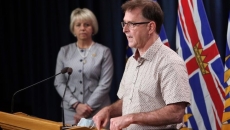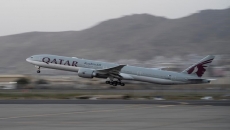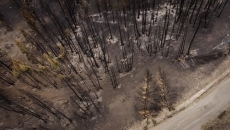"The last thing we would want is to be sort of in a situation where we see a lot of transmission of virus amongst young children that aren’t eligible to be vaccinated, and then put in measures after the fact," said Teri Mooring, President of BC Teachers’ Federation
How satisfied are you with the Province’s mask mandate keeping in mind that masks are not recommended for Kindergarten to Grade 3 students?
We are a little perplexed by it because what we’re seeing in other jurisdictions is that the virus is much more transmissible even amongst children. With the original COVID-19 last year, we saw that relatively few children got sick with COVID-19. But we think that the Delta variant is different, and we’re seeing that in other jurisdictions. This year almost 100 percent of the cases are of the Delta variant, so we haven’t been given a clear rationale as to why Kindergarten to Grade 3 students were excluded this year.
What’s your biggest concern at this point in time?
With the Delta variant so highly prevalent in our communities, that is a concern. What we’re saying is why are we not erring on the side of caution? Taking a cautious protective approach is what we would rather do. And the last thing we would want is to be sort of in a situation where we see a lot of transmission of virus amongst young children that aren’t eligible to be vaccinated, and then put in measures after the fact. Instead, put the measures in place early in the year and then ease them off later when those kinds of safety measures aren’t necessary.
Are you wanting a vaccination mandate for students and teachers?
We are not wanting a mandate but we want vaccination clinics to be set up in schools. When you look at the CDC data, it is a fairly disturbing picture in many communities in terms of low vaccination rates. We think there’s a need to ensure that there’s a real drive to get 12-17 year olds vaccinated. In the Interior Health region, they are at 21%, 20%, and 24% with second doses for 12 to 17 year olds, and in Northern Health region, we’re looking at 19%, 21% and 24%. Those are some pretty low numbers, especially in comparison with the general public in BC, so we’d really like to see some more pop-up clinics and vaccination clinics in schools.
What concerns you most about students between ages of 12-17 who are eligible for vaccination in regions within BC where there is vaccine hesitancy?
We think that’s an age group that really does need to be targeted. They have additional measures in place for schools above and beyond the Ministry of Education guidelines, which is great. There are many communities in Interior Health where we have low vaccination rates and a high prevalence of the virus.We are not seeing the same measures in Interior Health and Northern Health. We are not seeing the same in Northern Health as far as schools go, it’s perplexing. Especially given the vaccination rate, like in Northern Health region, there are actually many communities with some of the lowest vaccination ratesin the province.
If cases do rise, what sort of implementation would you like to see for school and staff?
If we find that cases are rising within schools, then we would fully expect that the provisions we are calling for would be put in place. So, a broader mask mandate; vaccination clinics attesting a provincial testing strategy, including asymptomatic; ensuring that ventilation systems are properly operating. We’ve been working with the Ministry of Education; I want to make clear that since Spring progress has definitely been made on ventilation systems. However, with school now in session, we don’t have a full accounting of all school districts in terms of what the status of their ventilation systems are, and what mitigating strategies are in place where the ventilation systems aren’t adequate. We know that some districts have targeted ventilation systems for upgrades and that’s necessary and this also takes time. Things like HEPA filters are stop gap measures that we expect to be in place, and so we’re just working with the Ministry now to determine and make sure that where those HEPA filters are needed and where other mitigation strategies are more appropriate, they’re actually in place.
What has been the response from BC parents to your open letter?
We’ve had a very positive response from families; we hear from families that are very concerned and there’s a lot to be concerned about right now during a pandemic. We’re trying to keep schools open, not close them because of outbreaks. We don’t want students missing precious academic time because they have to either self-isolate or quarantine. That’s why we would like to see more preventative measures in place so that schools remain open, and we’re very committed to that. These appropriate safety precautions need to be in place. We all had hoped that this school year would be different but the case counts are actually five times more than what they were last year at this time. So, there is a lot to be concerned about. There’s certainly nothing to be overly alarmed about as long as those preventative measures are in place. We are going to see what happens as the year progresses, because, again we are in a unique environment this year due to the Delta variant. It’s been a real game-changer.
Dr. Bonnie Henry’s announcement that COVID notifications would not be issued to schools for single exposures has caught some parents and teachers by surprise. What do you make of this?
The reason given was that it caused anxiety, and what I can assure you is that what causes greater anxiety is the fact that we don’t know what’s going to replace exposure notifications. There does need to be publicly available, timely, meaningful data about what’s happening in schools. The problem is that now that school is in session we know that data’s not going to be shared any longer. Those exposure notifications will be shared with close contacts only. So what other data points are we going to be able to rely on to give us a picture of what’s happening in schools now? The exposure notifications were not great. They didn’t supply much information. You didn’t know if it was one case of COVID-19 or there were 60 cases, there was just no way to ascertain that. But it did sort of raise awareness
about issues in certain parts of the province like the Surrey School District for example and as a result, Surrey teachers got fast-tracked for vaccinations.
How are educators and BCTF staff feeling going into a new school year?
Everyone is always really excited to go back to school; back to school is sort of the signal that we’re back to normal. I’m sure there are lots of mixed emotions as we have entered this school year. The teachers are vaccinated, and I’m sure there’s a level of comfort there. But there’s also greatconcern that we have the majority of our students in school that aren’t eligible for vaccination. Teachers are going to do their best to keep everyone safe and everyone comfortable and at the same time teach the curriculum. As well other responsibilities that teachers have is making sure kids wash their hands, all of the safety measures plus everything else that teachers regularly do. It’s a lot on the shouldersof teachers, and so that’s why we’re asking for the tools necessary to keep people safe, and the mask mandate is one. But we’d also like to hear a lot more about what the province’s plans are around vaccination clinics, around a testing regime. I think more information about those sorts of details would really help put people’s minds at ease.
Do you think going back to online learning could happen depending on how the situation unfolds?
I think there are a lot of unknowns out there, and so we’re hoping that we don’t see schools as the source of transmission of the virus and we don’t see the virus circulating around schools at a higher rate than we did last year. However, those are all possibilities and I think that what makes this such a stressful time is the unknown. I think what we’ve learned about this virus is it’s unpredictable. I don’t think any one of us, and certainly not myself are willing to make predictions about what could happen in the future. That’s why we think our best-case scenario here is to really ensure that those protective and preventive measures are in place early on. We can peel them back later as opposed to waiting to see if we end up with a lot of cases of COVID and then put measures in place as that just doesn’t make sense you know to us in the education system.
What’s your message for the community?
I really understand that we’re going through an extremely stressful time, and families have been so supportive of schools and it’s been a real collaboration around the safety measures. What I’m really hoping that families of young children do is that they send their children to school with masks and ask them to wear those masks. There will be schools that have different safety measures in place like start and end dates for different groups of students. There might be different lunches, for example, so that students are a bit separated. Not all schools are going to have the same safety measures in place because they all don’t have the same risk levels in place. So, we’re just asking for families to be understanding and be patient with those rules that are in place to keep everyone safe.






